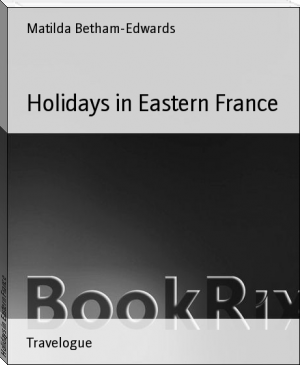East of Paris - Matilda Betham-Edwards (english readers .TXT) 📗

- Author: Matilda Betham-Edwards
Book online «East of Paris - Matilda Betham-Edwards (english readers .TXT) 📗». Author Matilda Betham-Edwards
Within the precincts of this hamlet we find ourselves in a bluish-green land of mingled wood and water; above the reedy marsh, haunt of wild fowl, willows grew thick; here and there the water flowed freely, its surface broken by the plash of carp and trout. At this season all hands hereabouts were busy with threshing out the newly garnered corn and getting in potatoes. The crops are very varied, wheat, barley, lucerne, beetroot, buckwheat, colza, potatoes; we see a little of everything. Artificial manures are not much used, nor agricultural machinery to a great extent, except by large farmers, but the land is clean and in a high state of cultivation. Peasant property is the rule; labouring for hire, the condition of non-possession, very rare. And whether the times are good or evil, land dirt cheap or dear, the year's savings go to the purchase of a field or two and, as a necessary consequence, to the consolidation of the Republic and the maintenance of Parliamentary institutions.
I will now say something of our neighbours. One of these was the parish priest, who had the care of between six and seven hundred souls. The fact may be new to some readers that a village cure, even in these days, receives on an average little more than Goldsmith's country parson, "counted rich on forty pounds a year." This cure's stipend, including perquisites amounted to just sixty pounds yearly, in addition to which he had a good house, large garden and paddock. But compare such a position with that of one of our own rectors and vicars!
The Protestant clergy in France are better paid than those belonging to the orthodox faith. Being heads of families, they are supposed, and justly, to need more. Let it not be imagined, however, that the priest receives less under the Republic than under the Empire. But the cost of living has increased.
Of course there are black sheep in the Romish fold as elsewhere; perhaps even the simplicity, learning and devotion to duty of the individual I here write of, are rare. Yet one cannot help feeling how much more money the Government would have at command with which to remunerate good workers in pacific fields if disarmament were practicable. This excellent priest, like other men of education and taste, would have relished a little travel as much as do our own vicars and curates their annual outing to Norway or Switzerland. What remains for recreation and charity after defraying household expenses and cost of a housekeeper out of sixty pounds a year?
Next, let me say a word about the _juge de paix_ in France, as I presume most readers are aware, a modest functionary, yet better paid than that of a priest. The average stipend of a justice of the peace is about a hundred pounds a year, with lodging, but although his duties often take him far afield he is not provided with a vehicle, and must either cycle or defray the cost of carriage hire. I know many of these rural magistrates, and have ever found them men of education and intelligence. I, now, for the first time, found one well read in English literature, not only able to discuss Shakespeare and Walter Scott, but the latest English novel appearing in translation as a feuilleton. It is well that these small officials should have such resources. Tied down as they are to remote country spots, their existence is often monotonous enough, especially during the winter months.
It seems to be a canon of French faith that you cannot have too much of a good thing, anyhow in the matter of wedding festivities. Parisian society is beginning to adopt English saving of time and money, fashionable marriages there now being followed by a brief lunch and reception. Country-folks stick to tradition, preferring to make the most of an event which as a rule happens only once during a lifetime. Gratifying as was the experience to an English guest, especially that guest being a devoted admirer of France, I must honestly confess that my share in such a celebration constituted probably the hardest day's work I ever performed. Here I will explain that the bride's father was head forester of my host and hostess, the great folks of the place, and adored by their humbler neighbours. Chateau and cottage were thus closely, nay affectionately, interested in the important event I am about to describe, and this aspect of it is fully as noteworthy as the truly Gallic character of the long drawn out fete itself.
By nine a.m. horses and carriages of the chateau, adorned with wedding favours, were flying madly about in all directions conveying the wedding party to and from the Mairie for the civil ceremony. An hour later we were ourselves off to the village church, the house party including three English guests. The enormously long religious ceremony over, a procession was formed headed by musicians, bride and bridegroom leading the way, fifty and odd couples following and the round of the village was made. At the door of the festive house we formed a circle, the newly-wedded pair embracing everyone and receiving congratulations; this is a somewhat lachrymose ceremony. The marriage was in every way satisfactory, but the nice-looking young bride, a general favourite, was quitting for ever her childhood's home. After some little delay we all took our places in two banqueting rooms, the tables being arranged horse-shoe wise. Facing bride and bridegroom sat my host, the second room being presided over by the bride's father, of whom I shall have something to say later. Here I give the bill of fare, merely adding that the festive board was neatly, even elegantly, spread, and that every dish was excellent:--
Hors d'oeuvre
Salade de saison Radis, beurre frais, Langue fumee
Fruits
Bouchees a la Reine
Brioche. Nougat
Daim, sauce chassuer
Desserts varies
Galantine truffee
Vins
Salmis de canards
Pineau, Bordeaux, Champagne
Choux-fleurs
Cafe, Liqueurs.
Dinde truffee.
Looking down the lines of well-dressed people, all with the exception of ourselves belonging to the same rank as the bride, I could but be struck with the good looks, gentle bearing, and general appearance of everyone. As to the head forester, he was one of Nature's gentlemen, and might easily have passed for a general or senator. At the table sat several young girls of the village, each having a cavalier, all these dressed very neatly and comporting themselves like well-bred young ladies without presumption or awkwardness. During the inevitable pauses between dish and dish, one after another of these pretty girls stood up and gratified the company with a song, the performance costing perhaps an effort, but being got through simply and naturally. In the midst of the banquet, which lasted over three hours, two professionals came to sing and recite. From the breakfast table, after toasts,--the afternoon being now well advanced--we again formed a procession to the Mairie, in front of which _al fresco_ dancing commenced. Add that this out-of-door ball lasted till a second dinner, the dinner being followed by a second ball lasting far into the small hours. Nor did the celebration end here. The following day was equally devoted to visits, feasts, toasts, and dancing. What a national heritage is this capacity for fellowship, gaiety, and harmless mirth!
Bar-sur-Aube lies twelve miles off and a beautiful drive it is thither from Soulaines. We gradually leave forest, pasture and arable land, finding ourselves amid vineyards. At the little village of Ville-sur-Terre, we one day halted at a farm-house for a chat, the housewife most kindly presenting me with two highly decorative plates.
As we approach Bar-sur-Aube we come upon a wide and beautiful prospect, wooded hills dominating the plain.
This little town is very prettily situated, and like every other in France possesses some old churches. Perhaps its most famous child is Bombonnel, the great panther-slayer, born close by, who died at Dijon and whose souvenirs bequeathed to me as a legacy I have given elsewhere. The son of a working glazier, he made a little fortune as hawker of stockings in the streets of New Orleans, returned to France, cleared the Algerian Tell of panthers, for a time enjoyed ease with dignity in Burgundy; on the outbreak of the Franco-German War in 1870, as leader of a thousand _francs-tireurs_, gave the Germans more trouble than any commander of an army corps, twice had a price of L1,000 set upon his head, was glorified by Victor Hugo, received the decoration of the Legion of Honour, and as a reward for his patriotic services several hundred acres of land in Algeria. A gigantic statue of Sant Hubert, the patron of hunters, now commemorates the great little man, for he was short of statue, in the cemetery of Dijon.
Bar-sur-Aube is connected with another notoriety, the infamous Madame de la Motte, the arch-adventuress, who, a descendant herself of Valois kings, proved the undoing of Marie Antoinette. As was truly said by a great contemporary:--"The affair of the Diamond Necklace," wrote Mirabeau, "has been the forerunner of the Revolution."
This Jeanne de Valois, rescued from the gutter by a benovolent lady of title and a charitable priest, presents a psychological study rare even in the annals of crime. Never, perhaps, were daring, unscrupulousness, and the faculty of combination linked with so complete a disregard to consequences. The moving spring of her actions, often so complicated and foolhardy, was love of money and display. It seemed as if in her person, was accumulated the lavishness of French Royal mistresses from Diane de Poitiers down to Madame Dubarry. There was a good deal of the Becky Sharp about her too, although there is nothing in her history to show that, like Thackeray's heroine, "she had no objection to pay people if she had the money." If, indeed, anything in the shape of





Comments (0)